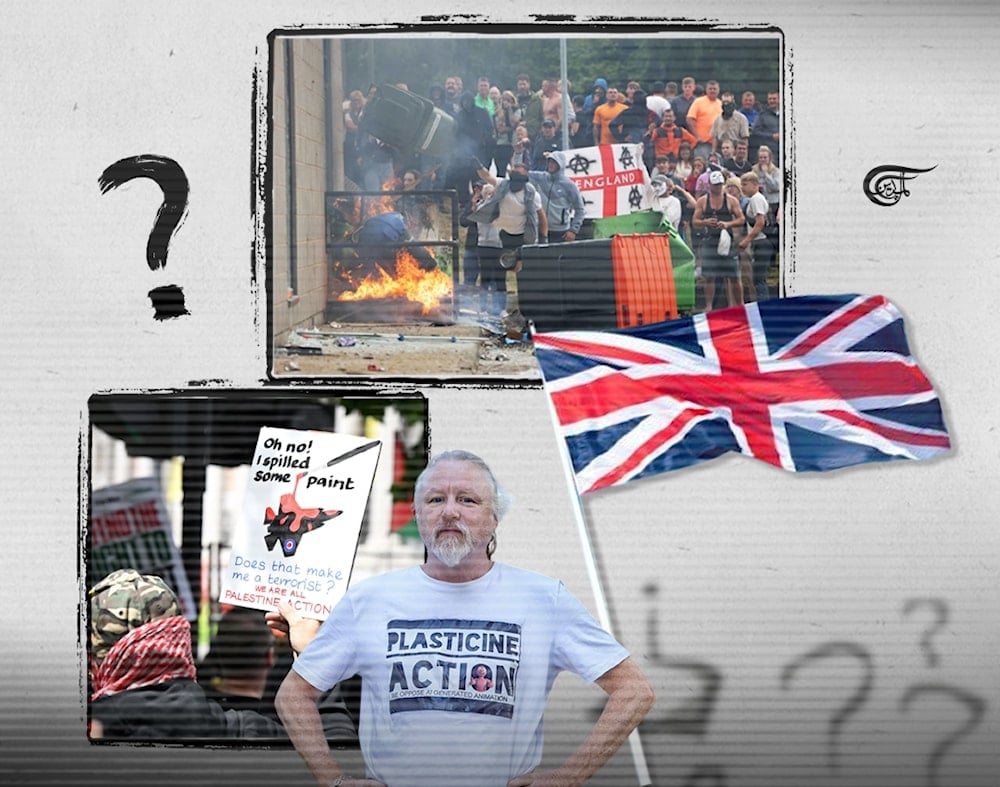News from Nowhere: The wages of hate
Alex Roberts discusses how Britain’s radical right has turned a jailed extremist calling for violence into a martyr, while vilifying peaceful pro-Palestine protesters, revealing a dangerous double standard at the heart of UK politics.
-

There are those on the radical right-wing of British politics who believe that those peacefully protesting the forced starvation of children should be dealt with as forcefully as troublemakers. (Al Mayadeen English; Illustrated by Batoul Chamas)
This August has seen the release from prison of a woman who, in July 2024, posted on social media that her followers should “set fire” to hostels housing asylum-seekers – as she called for “mass deportation now”.
Having been sentenced to 31 months in custody, and having served 40 per cent of her jail term, she has now (as is standard in such cases) been released on license under the supervision of the probation service.
Her case has been exploited as something of a cause celebre by radical right-wing voices in British politics and the media, and among the vacuously voluble commentariat who crowd the nation’s less salubrious watering holes.
Indeed, Conservative Party leader Kemi Badenoch has said that her sentence was “harsher than the sentences handed down for throwing bricks at police or actual rioting”.
Ms. Badenoch added that “protecting people from words should not be given greater weight in the law than public safety”.
It appears she does not view incitement to burning down asylum hostels as constituting a public safety concern.
It was no doubt merely a coincidence that the ex-con being defended by the Tory leader happens to be the wife of a Conservative councilor.
Other right-wing commentators have also grown incensed when comparing the case of the councilor’s wife to what they have seen as the lenient treatment of protesters against the Gaza war.
This is despite the fact that the UK government decided to outlaw support for a group called Palestine Action in the wake of an unfortunate incident involving individuals claiming association with that organization breaking into a Royal Air Force base in Oxfordshire, spray-painting two planes, and in doing so causing an estimated £7 million of damage.
Multiple arrests had already taken place during recent anti-war demonstrations, particularly in relation to apparent shows of support for such proscribed organizations. Indeed, a number of people have allegedly been arrested for displaying banners or T-shirts which have satirically expressed solidarity with fictional (but similarly named) organizations. Those people have been released without charge or further police action.
Of course, there are those who might suggest that wearing a “Plasticine Action” T-shirt could be considered intentionally provocative, but fans of the Oscar-winning, plasticine-based, animated adventures of Wallace and Gromit may feel that they have every right to voice their allegiance to the vanquishers of the legendary Were-Rabbit.
There was also mingled shock and amusement at the arrest of a man holding a placard emblazoned with a cartoon from a satirical magazine which ridiculed the government’s ban on expressions of support for the proscribed group.
“I thought, this is all a bit surreal,” said the arrested man.
In that context, it seems absurd of the radical right to be suggesting that action taken against rioters and individuals inciting criminal damage and violence is somehow disproportionately and unfairly more severe than the police response to protesters peacefully promoting their support for a banned organization, or for an organization which sounds a bit like one, or simply their opposition to a devastating conflict or their human feeling of empathy, compassion and café in the face of a major humanitarian crisis.
In fact, given that the UK government looks shortly set to issue its formal diplomatic recognition of the state of Palestine, this might all seem a bit odd indeed.
There are those on the radical right-wing of British politics who believe that families and pensioners peacefully expressing their opposition to the forced starvation of children should be dealt with as forcefully as troublemakers seeking to subvert and exploit legitimate protests – or indeed as thugs attacking the police with bricks and stones and advocating deadly violence against refugees.
There will sadly always be people who think that way, and it is one of the burdens and benefits of living in a liberal democracy that we accept people’s rights to express such views.
The tragedy is that those perspectives are on the political ascendant – and that there is a possibility (despite the fact that their deeply disunited and dysfunctional party has been losing parliamentarians and councilors all over the place) that the shower of incompetent xenophobes threatening to “reform” the country may hold significant (if not overwhelming) power in government – in the devolved nations of the UK (most possibly in Wales) next year, and even in Westminster in 2029.
Unless the good people of the UK can be roused from the same sleep of unreason which propelled Donald Trump into power twice, that possibility seems terrifyingly real.
The last few weeks in England have seen people hoisting union flags onto lampposts and painting the Cross of St George onto roads and roundabouts. This has not, apparently, been done in support of the England team in the Women's Rugby World Cup – but seems to be an attempt to claim racist and xenophobic views as somehow patriotic.
Indeed, a quick scan of the subject on social media will sadly confirm this latest appropriation of the British and English flags by those who believe that it is better to divide, snarl and hate than to try to come together to help solve the terrifyingly challenging problems faced by our increasingly broken world.

 Alex Roberts
Alex Roberts
 5 Min Read
5 Min Read











